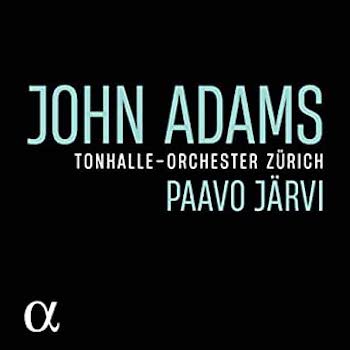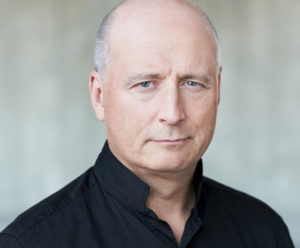Classical Album Review: “John Adams” — Mastering the Style of an Iconic American Composer
By Jonathan Blumhofer
This recording presents one of the most lucid and well-programmed portraits of John Adams to emerge, well, in a long while.

Paavo Järvi and the Tonhalle-Orchester Zürich mightn’t be the first pairing one associates with the music of John Adams. But, as their new album – simply titled John Adams – attests, they’ve pretty much got the iconic American composer’s style down pat.
Of course, it didn’t hurt that Adams was in residence in Switzerland for part of last season. Even so, the ensemble’s approach to his music adds a singular dimension to that regularly displayed by the more typically Adams-affiliated groups in San Francisco, Los Angeles, and London.
Rhythmically, the Swiss band really digs into the proceedings here. That’s especially true of their account of Lollapalooza, a whimsical 1995 curtain-raiser written dedicated to Simon Rattle. Järvi’s tempo is notably slower than either Kent Nagano’s or Michael Tilson Thomas’s in their recordings (with the Hallé Orchestra and New World Symphony, respectively). Yet, if the reading is less overtly edgy, it’s perhaps jazzier than its forebears. And it certainly doesn’t want for energy (the sixteenth-note runs are consistently furious) or textural clarity.
Similar qualities mark Slonimsky’s Earbox, another mid-‘90s effort, though one that’s often overshadowed by Adams’ bigger pieces from the era. This performance makes you wonder why. It’s brilliantly energetic, yes, but Järvi’s command of its structure is the real story: this is as coherent a Slonimsky as has been played, clearly drawing on all the threads of Adams’ style up to about 1996 while also suggesting what was to come in pieces like Naïve and Sentimental Music and Son of Chamber Symphony.
Also, My Father Knew Charles Ives, Adams’ semi-autobiographical 2003 tone poem that, last year, was the highlight of a disc from the Nashville Symphony. Järvi and the Tonhalle-Orchester are, generally, a bit more relaxed in their tempos than their counterparts in Tennessee, especially in the first movement. But the performance never slogs; rather, it overflows with atmosphere and color.

Conductor Paavo Järvi.
The first movement’s (“Concord”) climactic textures are all distinct but evenly embedded – arguably better, in fact, than in prior recordings. And the sudden dissolve into the Coda is handled with magnificent sensitivity. Ditto for the central “The Lake,” with its evocations of fog horns, nightclub piano, and big bands echoing across Lake Winnipesaukee. Bold contrasts of character and spirit mark the finale (“The Mountain”), which channels Ives and Sibelius in almost equal measure.
Rounding things out is a carefully-balanced account of Adams’ 1986 fanfare Tromba lontana. Perhaps less familiar than its more vigorous companion piece, Short Ride in a Fast Machine, Tromba lontana, with its delicately dancing textures, potently complements My Father Knew Charles Ives.
The end result is one of the most lucid and well-programmed portraits of Adams to emerge, well, in a long while. As such, it’s an excellent way to mark the composer’s 75th birthday this year – or just his general contributions to contemporary music, which, as this disc reminds, have been anything but commonplace or predictable.
Jonathan Blumhofer is a composer and violist who has been active in the greater Boston area since 2004. His music has received numerous awards and been performed by various ensembles, including the American Composers Orchestra, Kiev Philharmonic, Camerata Chicago, Xanthos Ensemble, and Juventas New Music Group. Since receiving his doctorate from Boston University in 2010, Jon has taught at Clark University, Worcester Polytechnic Institute, and online for the University of Phoenix, in addition to writing music criticism for the Worcester Telegram & Gazette.

